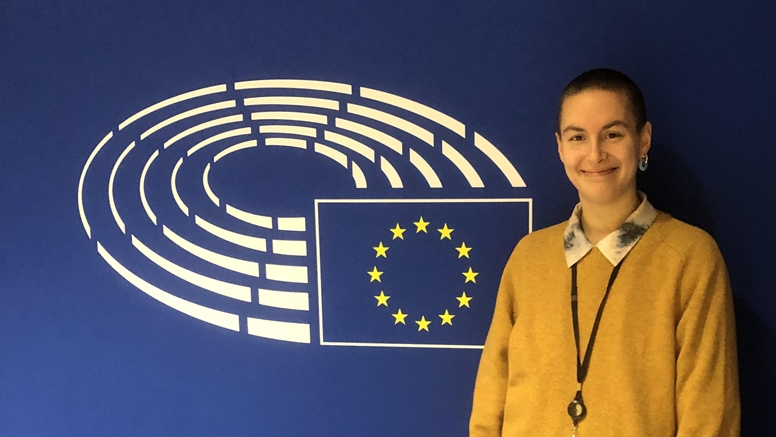Two Alums Pass Difficult United Nations Interpretation Exam
| by Darcy Morter
Two Middlebury Institute alumni in the Conference Interpretation program have passed the demanding exam required for United Nations interpreters.

Middlebury Institute graduate Ioana Lobontiu MACI ’22 realized a longtime personal ambition recently when she passed the accreditation examination qualifying her as an interpreter for the European Union (EU).
“Becoming an accredited EU interpreter has been a major goal of mine since I was 18!” says Lobontiu, a multilinguist who is now certified to interpret for the EU in both German-English and French-English language combinations. Her multilingual skills gave her a distinct advantage, as this particular combination is highly sought after.
“I’m so impressed that Ioana passed her accreditation exam so soon after graduation and before even completing her internship at the EU,” says Laura Burian, dean of teaching, learning, and faculty development, who is also a professor of translation and interpretation. “This speaks to how our program prepares our students for the rigorous exams that serve as a gateway to exciting careers at international organizations like the EU.”
Lobontiu is now eligible to perform contract interpretation for organizations including the European Parliament, the European Commission, and the EU Court of Justice.
Her fascination with language dates from childhood. Born in Romania, she moved to Tennessee with her family when she was two, then to upstate New York, then back to Romania for a few years, and then to Alaska.
“I remember that growing up, I resented speaking to my parents in Romanian, or conversely having to take extra English lessons when I lived in Romania. But then I took my first French class in middle school, and it was just love at first sight! After that it just became natural for me to want to learn new languages, to be able to talk to a whole new set of people, to take in new cultures.”
She attended middle school and high school in Anchorage and earned a BA in German, French, and International Studies from the University of Alaska Anchorage before moving to Austria to take courses in German at the University of Vienna.
“I wanted to keep up my French skills as well,” she says, “so I decided to pursue an MA in French Language from the Middlebury Language Schools. Each summer I would practice my French on the Vermont campus, and then last summer I finished that master’s in Paris.”
She adds that her coursework and professors in the Institute’s MA in Conference Interpretation were “very helpful in preparing me for the exam and for interpreting in general: from the current affairs topics we broached, especially those related to EU issues, to how to prepare for a conference, to glossary management.” She offers special praise for Professor Julie Johnson’s mindfulness courses, noting that “managing your nerves is a crucial part of interpretation, and I plan on meditating before as many meetings as I can so that I can go in feeling calm and cool-headed.”
“Interpreting can be stressful,” agrees Johnson. “With mindfulness practice, students realize they’re able to focus their attention and calm their own nerves with a kindness that frees them to perform at their best. That’s why we offer the course. I love that interpreters like Ioana carry this with them into their professional work.”
Lobontiu’s number one tip for current students who may be interested in working for the EU is to pay attention to your visa and/or citizenship status, which she calls “the biggest stumbling block to working in Europe. If you don’t have European citizenship, I would look into the requirements for the visa process as soon as you can.” She also notes that “for freelancers, location is key; you’re likely to get quite a bit more work if you live in Brussels or Luxembourg.”
Lobontiu passed the EU accreditation exam near the end of an internship at the European Parliament in Brussels, Belgium, during which she helped organize virtual classes connecting student interpreters from partner universities all over Europe with EU staff interpreters.
“For the time being, I plan to stay in Brussels and work as a freelancer, and from there we’ll see where life takes me! I might take the exam to become an EU staff interpreter if a post opens up, but for now I’m just excited to roll my sleeves up and get into the booth.” And her language learning journey isn’t over yet: “Right now I’m already thinking about which language I should add next!”
| by Darcy Morter
Two Middlebury Institute alumni in the Conference Interpretation program have passed the demanding exam required for United Nations interpreters.
| by Jason Warburg
Middlebury Institute students Andrew Belisle MACI ’23 and Leilani Padilla-Young MATI ’22 both recently passed the notoriously difficult Federal Court Interpreter Certification Examination, qualifying them to serve as interpreters in any federal courtroom.
| by Sierra Abukins
Sidharth Babu MATI ’24 shares how advanced language study has been critical in his role fostering understanding and relationships between China and India.